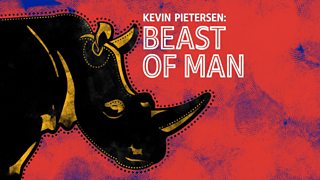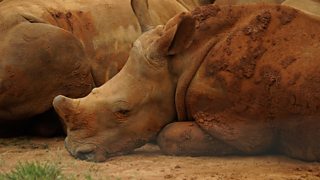What are the solutions?
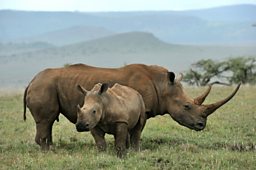
So you already know that ', but what can be done about it?
From the people 5 Live have spoken to in the making of the podcast, it seems there are two key long-term areas that need working on; providing poachers in South Africa with an alternative income – for example through providing them with an income from wildlife tourism - and reducing the desire for rhino horn in parts of Asia.
Charities like Traffic and Education for Nature Vietnam are working hard on demand reduction initiatives, but critics argue it could take a generation to change attitudes.
Would this video change your behaviour? It’s from NGO Education for Nature Vietnam and targeted at rhino horn consumers:
(Warning: Third-party content may contain adverts)
Cathy Dean, CEO, of conservation charity Save the Rhino International says: "There is no single solution when it comes to saving rhinos.
There is no single solution when it comes to saving rhinos."Cathy Dean, CEO of Save the Rhino International
"It needs a combination of approaches: law enforcement in all its forms (protection, investigations, prosecutions), maximising the growth of rhino populations through biological management, ensuring that rhinos are valued by communities (local and global), reducing the demand for illegal rhino horn in consumer countries, and ensuring that lessons learned are disseminated to all stakeholders."
One man is offering another solution.
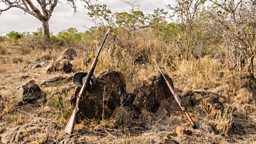
John Hume privately owns a rhino farm in South Africa.
He believes he has two solutions. The first is de-horning his rhinos, to take away what the poachers want. Rhinos are anaesthetised and their horns removed down to the stump. Alongside expensive security measures, John argues this has stopped his rhinos being poached.
In Mpumalanga, South Africa (where’s John’s ranch used to be based), out of the 33 rhinos killed between 2009 and 2011, , Save the Rhino International reported.
However, according to the charity, in other parts of Africa in the early 90s - for example, in Hwange National Park in Zimbabwe - the majority of de-horned rhinos were killed .
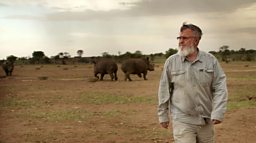
The international trade in rhino horn has been banned since 1977.
We need to legalise the trade in rhino horn worldwide. We need to encourage people to breed rhinos"John Hume, rhino breeder
But this is John’s second solution: "We need to legalise the trade in rhino horn worldwide. We need to encourage people to breed rhinos. There are a lot of people in South Africa who care about money more than rhinos, and in South Africa a rhino is still worth more dead than alive.
"The illegal trade in rhino horn in South Africa is rampant. It happens all the time. The illegal trade is killing our breeding stock in this country. My type of trade will kill no stock."
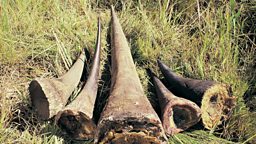
But opponents say that, among other things, flooding the market with rhino horn will only increase demand.
In 2017, John Hume was allowed to sell rhino horn domestically in a one-off auction.
Jimmiel Mandima is from the African Wildlife Foundation, and was against the idea in an online article:
He said: "Legalising rhino horn trade in South Africa can provide a legal cover for traffickers and implies there is ample opportunity to sell their products to buyers in China, Vietnam, and other Asian demand markets.
"Dangerous loopholes can emerge and enable rhino horn smuggling, directly undermining China’s enforcement actions against this illegal trade.
"Not to mention, this can potentially reignite the previously debunked belief that rhino horn possesses medicinal properties."
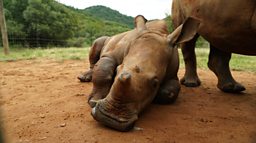
And there are other solutions being proffered.
When it comes to rhinos that are trophy hunted, so-called ‘dart' or ‘green’ hunts are being offered in South Africa.
A client can stalk and shoot a rhino, but instead of killing them with a bullet, they shoot the animal with a vitamin dart.
The hunt organisers deliberately target rhinos that need some kind of medical check-up or micro-chipping.
After the vitamin shot has been fired, a vet tranquillises the rhino and carries out health checks on it. At the same time, hunters can have their picture taken next to the rhino, as a souvenir.
And some take these 'green' or 'dart hunts' one step further.
Whilst tranquillised, the rhino is photographed and measured and a taxidermist makes a fibreglass replica of the rhino – so the hunter still gets their ‘trophy’.
Dart hunting is recognised by hunting associations like Safari Club International for entry into their record book and hunting competitions - in the ‘darted rhino’ category. Meaning, in essence, the hunter still gets credit for shooting one of the 'big five'.

As well as the collective things that need to be done, what can individuals do?
If everyone did just one thing to help, we could protect many more rhinos"Cathy Dean, CEO of Save the Rhino International
Cathy Dean, CEO, of Save the Rhino International says: "Everyone can make a difference.
"If you’re lucky enough to go on safari to one of the African or Asian rhino range states, make sure you choose a responsible tour operator so that part of the cost of your holiday reaches the local communities living alongside rhino areas.
"If everyone did just one thing to help, we could protect many more rhinos."
Want to hear more? Download the podcast
-
![]()
Trailer: Kevin Pietersen: Beast Of Man
The rhino. An icon, all but extinct. A maverick who never backs down says he鈥檒l save them. It鈥檚 raw. It鈥檚 war.
